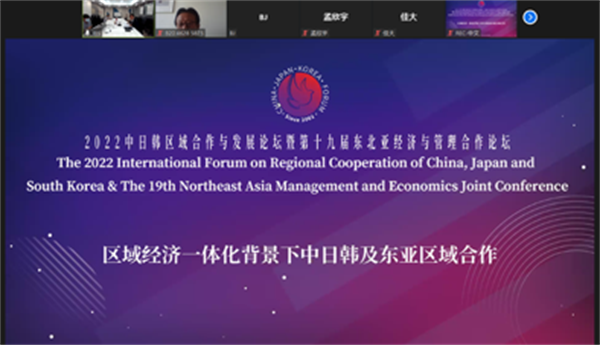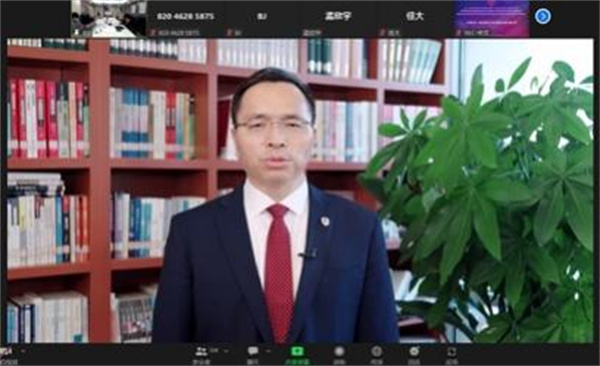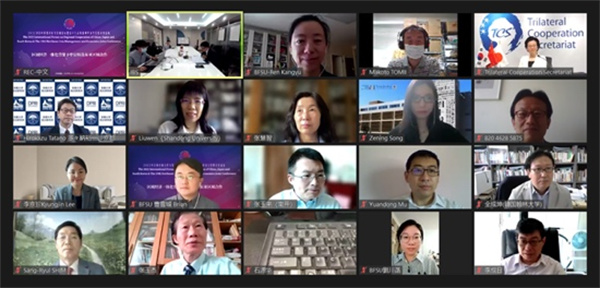- Research
- Research Centers
- Journals
- Admission
- Introduction
- Programs
- Application
- Alumni & Giving
- Alumni Club
- Giving

BFSU hosts the 2022 International Forum on Regional Cooperation of China, Japan and ROK and the 19th Northeast Asia Management and Economic Joint Conference via video conference from May 27 to 28. [Photo/bfsu.edu.cn]
Beijing Foreign Studies University (BFSU) hosted the 2022 International Forum on Regional Cooperation of China, Japan and the Republic of Korea (ROK) and the 19th Northeast Asia Management and Economic Joint Conference via video conference on May 27 to 28.
With the theme of promoting cooperation among China, Japan, the ROK and the East Asia amid regional economic integration, the virtual meeting brought together over 60 experts and scholars from renowned universities, including BFSU, the University of International Business and Economics (UIBE), Shandong University, Fudan University, Nankai University, the Economic Research Institute for Northeast Asia (ERINA), Kyoto University and Chungnam National University.

Yang Dan, deputy Party secretary of the CPC BFSU committee and president of the university, speaks at the forum. [Photo/bfsu.edu.cn]
Noting that the Northeast Asia Management and Economic Joint Conference has been held 19th times and it is the sixth time for BFSU to host such a summit on regional cooperation, Yang Dan, deputy Party secretary of the CPC BFSU committee and president of the university, said the forum has become a high-level event with great influence in Northeast Asia over the past two decades.
China, Japan and the ROK should work together to fight the wave of rising anti-globalization, which includes military confrontation, unilateralism, protectionism, economic decoupling and long-arm jurisdiction. They should confront, amid the COVID-19 pandemic, geopolitical rivalry and the accelerated changes of the international landscape. As interdependent neighbors in Northeast Asia, the three countries share similar culture, common history and complementary industries. Closer exchanges and cooperation among them bear great importance to the prosperity and stability of the region and the economic growth of the international community, Yang said.

Experts and scholars exchange views at the 2022 International Forum on Regional Cooperation of China, Japan and ROK and the 19th Northeast Asia Management and Economic Joint Conference. [Photo/bfsu.edu.cn]
Ou Boqian, secretary-general of the Trilateral Cooperation Secretariat, a Seoul-based international body for regional peace, called on the three nations to deepen cooperation on trade and finance, digital economy and green economy amid mounting headwinds.
Speaking in his keynote report, Mimura Mitsuhiro, principal researcher at the ERINA, stressed that the three countries should further enhance cooperation in politics, economy, trade and culture and pilot the building of common goals in such fields as sustainable development to facilitate regional interaction and collaboration as the trend of globalism is being overtaken by regionalism.
Li Guangyao, chief expert of the China Institute of Free Trade Strategic Studies at UIBE, suggested that the three nations should strengthen ties on economic and trade, tariff agreement and the building of industrial, supply, value and ecological chains on the basis of the Regional Comprehensive Economic Partnership agreement.
Shim Sang-ryul, dean of the Graduate School of Business Administration at Kwangwoon University, said compared with price, research and development and innovation are playing a more important role in global value chain rebuilding. The rebuilding will not be a short-term economic behavior. Apparently it’s driven by long-term forces.
Hirokazu Tatano, a professor from the Disaster Prevention Research Institute at Kyoto University, put forward a latest model in the measurement of the impact exercised by natural disasters upon economic growth.
Xie Tao, dean of the School of International Relations and Diplomacy at BFSU, noted that the three countries should exercise more wisdom to settle their differences over both historical and contemporary issues since the in-depth economic cooperation hasn't promoted mutual trust among their people in a natural way.
On the sidelines of the forum, experts and scholars from the three countries also held discussions on the following issues: disaster prevention and international cooperation on security guarantee, political trust and cooperation-induced co-existence, the integration of regional economy, the consolidation and rebuilding of the value chain, and the cooperation in Northeast Asia against major powers.
The event received over 40 academic papers. Ten papers from BFSU, Shandong University, Jiangsu University and the Renmin University of China won excellent paper awards.